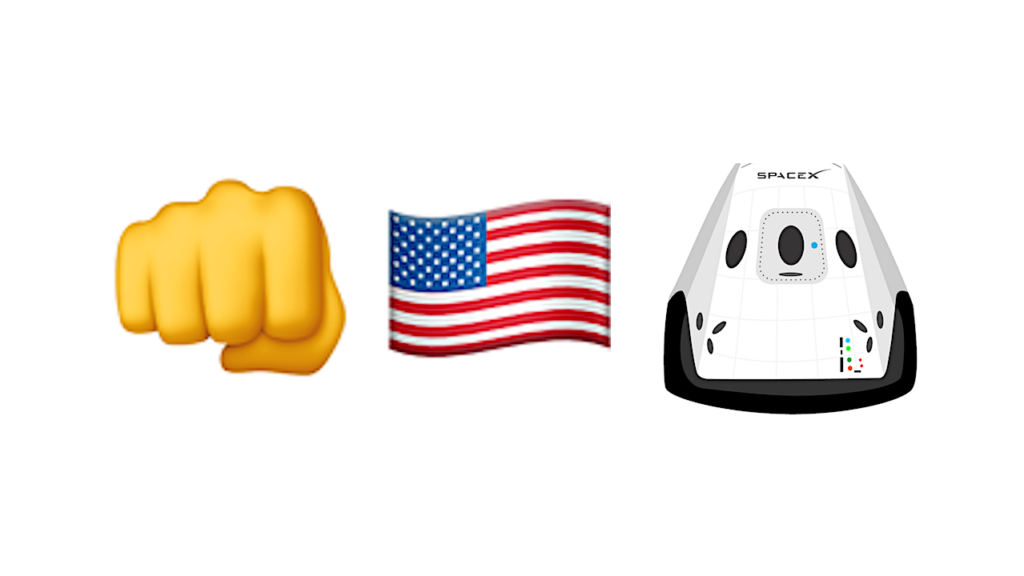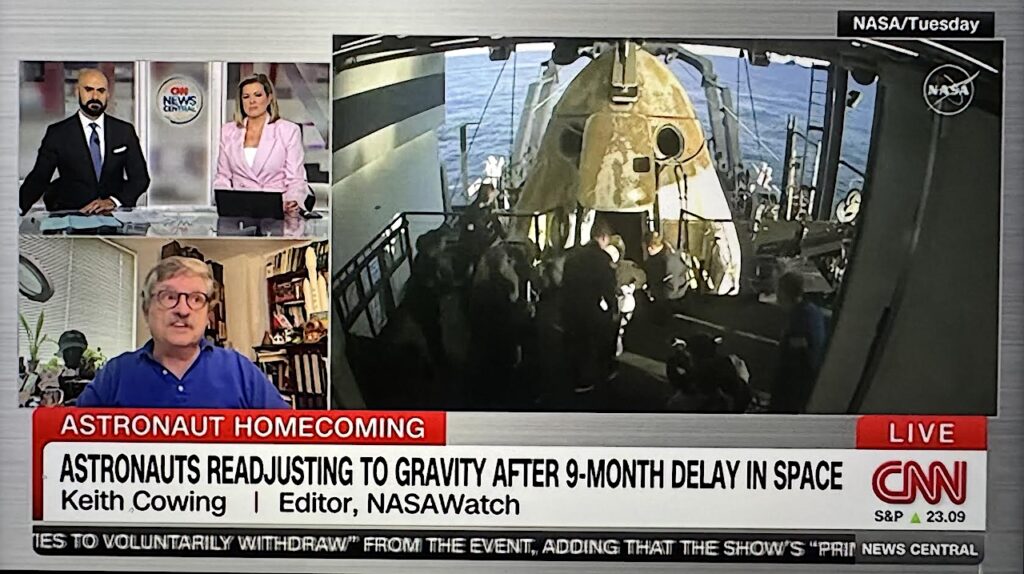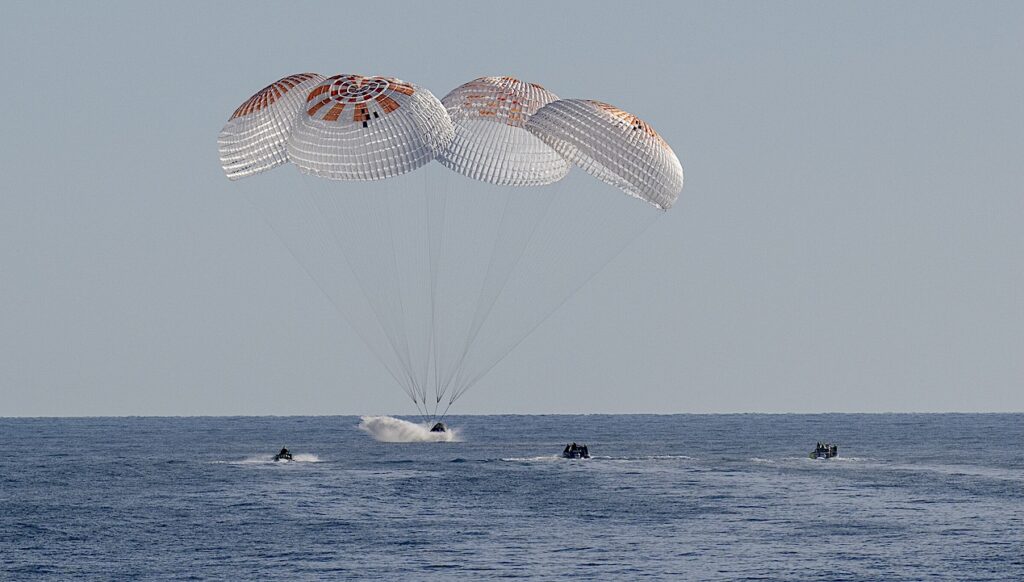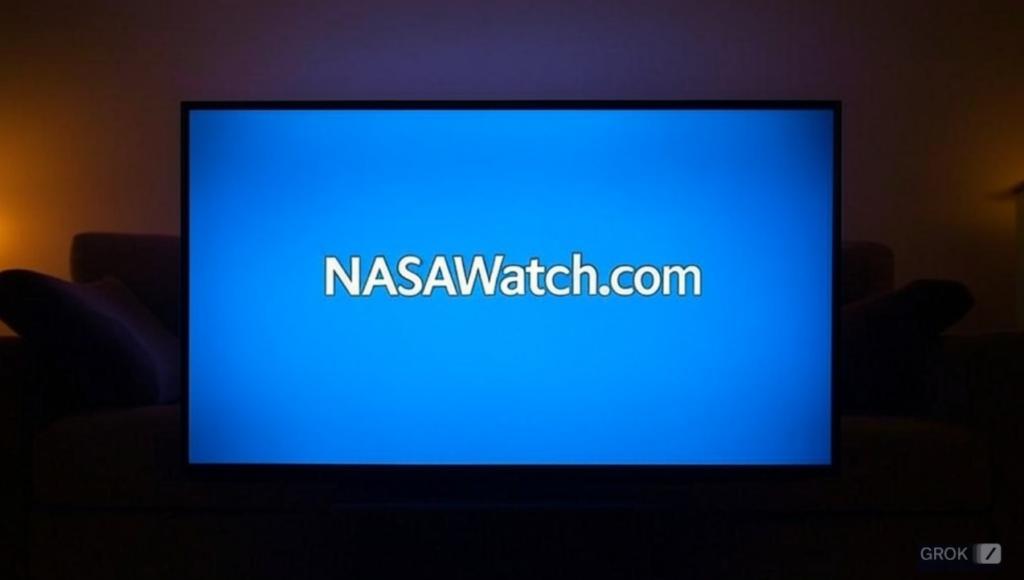The Remarkable International Success Of The ISS

 Keith’s note: Stop for a moment and look at the expanding disarray in terms of America’s relations with other nations – one that is exacerbated by a global pandemic. Where is the one place where a multi-national program has operated – smoothly – as a real partnership – with no real problems between the partners? Answer: the International Space Station. This is a consummate example – for all involved – as to the value of soft power. There actually are things more important than transient food fights back on Earth. This aspect of the ISS is often lost and rarely played up to the extent it warrants. Living in space can teach us how to live on Earth. Oh yes: Let’s try and keep the ISS success story in the forefront as we start to make noises about war in space and claiming things out there for personal use.
Keith’s note: Stop for a moment and look at the expanding disarray in terms of America’s relations with other nations – one that is exacerbated by a global pandemic. Where is the one place where a multi-national program has operated – smoothly – as a real partnership – with no real problems between the partners? Answer: the International Space Station. This is a consummate example – for all involved – as to the value of soft power. There actually are things more important than transient food fights back on Earth. This aspect of the ISS is often lost and rarely played up to the extent it warrants. Living in space can teach us how to live on Earth. Oh yes: Let’s try and keep the ISS success story in the forefront as we start to make noises about war in space and claiming things out there for personal use.
|
|









Earth to NASA, Earth to NASA, Come in NASA: Is anyone in charge of getting the ISS partnership nominated for the Nobel Peace Prize?
According to the Thomas Stafford Museum Thomas Stafford and the Apollo-Soyuz Mission did receive a nomination for the Noble Peace Prize so why not the ISS.
Probably a similar thing for the research stations on Antarctica – just saw a documentary about that experience.
And global meteorology, astronomy, wildlife conservation, etc. The ISS merely fits into the centuries long pattern of science being global. Even during the Revolutionary War orders were issued to American naval ships to not interfere with Captain Cook’s Expedition.
Science is global…and it’s not.
And while there are certainly parallels, the ISS morphed out of Freedom for very specific geopolitical reasons.
Correct, Bob. There was also great gnashing of teeth at the ‘shift’. Certain unhappiness remains, too, about the poor publication density coming from the ISS.
These are trivial in my view. Our collective work at this historical stage is pretty simple: keep the lights on in space; generate enthusiasm where we can; and avoid the big headlines (nobody in real America has a clue about the cost of rocket engines; a $500 hammer, though, is easy to distill).
And keep going. Make steps forward of any kind, big or small, but keep going. Planners’ useful concept called ‘mental map’ first nicely here. We want space to be part of every human being’s mental map.
It’s also why Tom Cruise in space is so terrific.
While we all been arguing about the cost and benefits of ISS, maybe this is one area nobody has thought of. Kind of like the Apollo 8 earthrise photo, it was not planned, nobody in NASA, aerospace industry, govt agencies, eggheads around the world ever thought of this planet in the way i.e. Earth Day (and appears we have forgot).
Exactly.
did the Freedom logo intentionally look like a football ?
Actually it is shaped like a British WWI tank.
yes, the badge is shaped like a British WW1 tank, but the logo on the badge looks (to me) like a football (not a soccer ball).
I dont think there is a lot of thought going on about ISS. In NASAs higher ranks there appears to be a lot of thought about new spacecraft being flown for the first time and how to get a man and woman on the Moon. Look at Begg’s recent NASA obit, no one even thought it worthwhile to mention he had a role in ISS; in fact Begg’s tireless efforts were the reason Reagan approved ISS in the face of almost universal opposition. ISS did not even get a mention. As far as a Nobel, I thought it had been nominated a couple times. One problem is that NASA has never printed a glossy sales brochure pictorial espousing its attributes. Whatever positive material there might be is lost on the internet, as Keith well knows.
I think it really comes down to the fact that most people are not connected with the space program (well they are i.e. things like GPS). Ever notice it is always the same 20, 30 or so people that post comments on NASAWatch? The usual stream on NASA TV showing the ISS is generally same material that’s been streamed for years.
Though many more people were connected with the space program in 1960s as NASA budget was higher but they also employed many more that nowadays has been replaced by technology. But also stuff like an article in CQ magazine about Apollo spacecraft communications listed the UHF frequencies. That prompted Larry Baysinger of Louisville KY to built a receiver and antenna to pickup transmissions by Armstrong and Aldrin (“Lunar Eavesdropping” https://www.vofoundation.or….
Fast forward to these days I don’t expect NASA will ever to list exact frequencies used on ISS but finding techie stuff on the comm system is very difficult (unless you are in the know i.e. work on those systems). At best can only find very general illustration of a lightning bolt between ISS, TDRS, and earth. Just saying.
Mr. Wright’s point is precise and accurate. Lots of people that I know regard NASA as the ‘official’ US repository of Very Hard Things. Of where the smart people work. Of where impossible things are made possible. And most importantly, an almost singular point of American pride.*
This is why NASA support is strong, by and large. Folks might not understand NASA, but damn it, it is OUR NASA!
At least that’s what I see.
And it is why I’ve been beating the same drum regarding Mr. Cruise, and about movies made with the NASA logo or help; ANYthing that broadens the base is good as long as it reflects positively for NASA.
*As I was writing that little piece of jingoism I kept thinking that comments might say something like “If they only knew!” Meaning if the public knew about the dirty laundry that we see here from time to time. But even so- even with throwaway engines- everything I wrote above is true. It’s too easy to keep a critical eye towards NASA, forgetting just how wonderful it is. Warts and all.
You’re right, few know very much about what ISS is or what it does. NASA’s main message is ‘its big, its great, its doing wonderful science’*. The international integration aspect which might be the key to Keith’s Nobel, gets little focus on what it means or how it happened or how it works today. *The science, a lot of people think (particularly in NASA’s higher ranks), is what its really all about. It wasn’t. It was one piece. Science was not why Reagan approved it. As far as whether its wonderful science or not, if and when there is a truly major scientific breakthrough, that might show the significance of the science; we all hope that might someday happen. I’ve not seen or heard of that breakthrough yet. The more they preach science to the exclusion of other aspects, the less significance ISS appears to have. Another problem is that a lot of the people think ISS started 20 years ago-it didn’t; that was when the first crew took up residence. Or some NASA people think ISS started in 1993; it didn’t that was just when the Russians and a lot of the current ISS managers came on board. Station started in 1984 under James Beggs, and then became Freedom and later became ISS.
One might argue that it began 10+ years earlier with the IPP in 1969. The original ‘plan’ was to build a station (partly with Saturn Vs) and develop a shuttle to service it. But since that was going to cost too much as a package, station got put on hold between 1971 and 1982 (as NASA developed and got flying the servicing shuttle). It was then when Beggs & Marks began the big push to make it the ‘next logical step’ (built on the early STS-framed studies of the late 70s).
the ISS is international on somethings, but the Russian side is still just Russian. The rest of the station is very international. https://www.airspacemag.com…